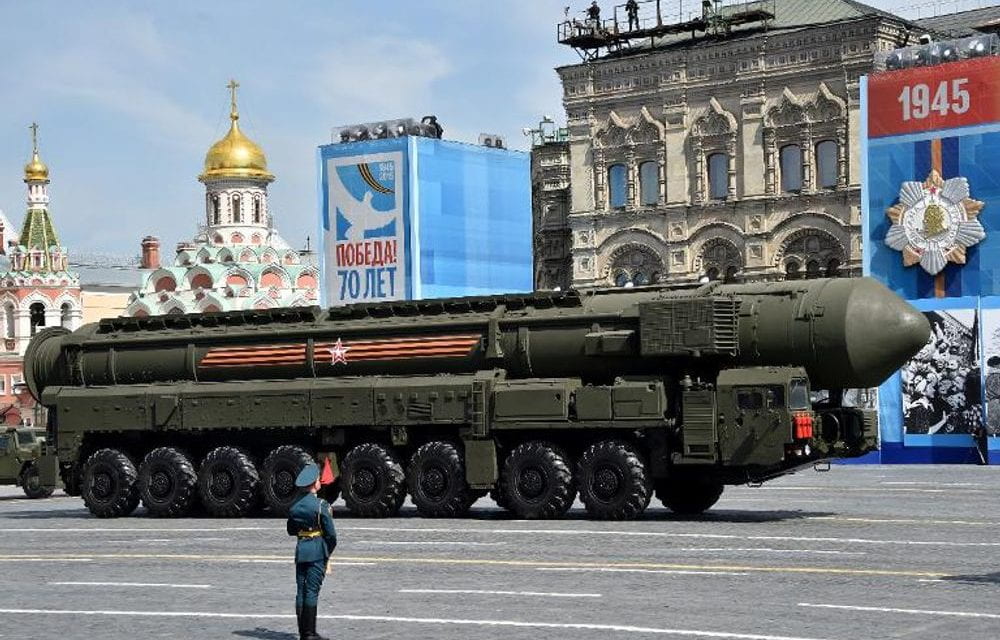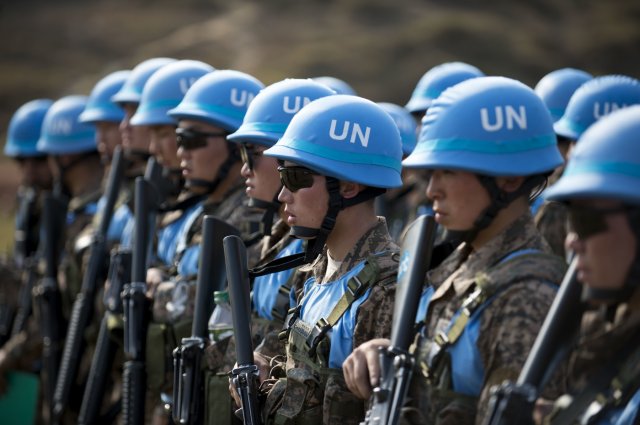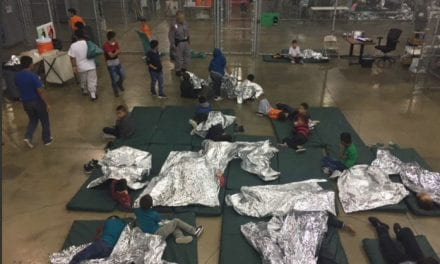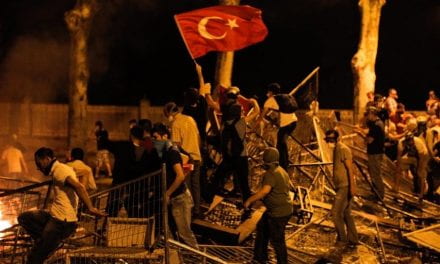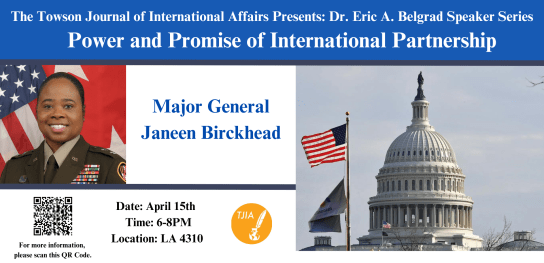On March 24th, President Biden announced that North Atlantic Treaty Organization (NATO) would be inclined to respond if Russia were to employ the use of chemical weapons in Ukraine. “We would respond…We would respond if [Putin] uses it…The nature of the response would depend on the nature of the use.” [1]
The Russo-Ukrainian conflict has left many political pundits baffled, as Ukrainian forces have been able to significantly deter Russian forces for nearly three months as of this writing since its initial outbreak. Russian forces have been significantly demoralized and U.S. intelligence reports state that Putin has grown deeply outraged at the current outcome of a conflict that was only supposed to last several days. [2] In the West, NATO allies are preparing for a possible escalation of force by Moscow in order to gain the upper hand in Ukraine, leaving political scientists to ask: could chemical or biological weapons be used? In the wake of a chemical or biological attack on Ukraine, the United States and NATO allies must be able to respond promptly through peaceful means, such as sanctions and diplomacy, to cripple Russia’s geopolitical and economic power within the international community.
Historical Context
Russia has a long and complex history regarding the use of Weapons of Mass Destruction (WMD), aside from nuclear weapons. Despite becoming party to the Geneva Convention in 1949 and its subsequent protocols, the Soviet Union continued to significantly expand its capacity to employ biological and chemical weapons. [3] The Kremlin has now inherited the capability to weaponize anthrax, brucellosis, glanders, Marburg virus, plague, Q fever, tularemia, and smallpox as a result of Soviet-era development programs. [4] With the ability to wield deadly chemical and biological agents, Moscow is able to put the lives of thousands on the line.
Putin does not seem to fear the repercussions of using banned weapons against his political opponents. The Kremlin has been linked to the killing of former Russian intelligence officer Alexander Litvinenko with a radioactive agent in response to his defection to the West in 2006 [5] as well as poisoning another defector, Sergei Skripal, and his daughter with a deadly nerve agent in 2018. [6] The attack on Russian political opponent Alexander Navalny was the most recent to make news headlines after he was poisoned by a nerve agent on a flight from Siberia to Moscow in 2021. [7]
The Kremlin has also been notorious for utilizing WMD for purposes of supporting hostile regimes and suppressing opposition movements. During the Orange Revolution, an increasingly forgotten moment of civil resistance in Ukraine, anti-Russian presidential candidate Viktor Yushchenko was poisoned with dioxin, a cancer-causing chemical agent. [8] In the midst of the Syrian Civil War, Syrian President Bashar al-Assad used sarin gas on Syrian citizens, and reports from American intelligence services indicate that Russia spewed disinformation in a ploy to cover-up origins of the attack. A declassified report from the U.S. National Security Council indicates that Moscow attempted to link the use of chemical weapons to militant terrorist groups, thus deflecting blame to outside actors, a common strategy used to evade being linked to human rights violations. [9] Russia has been referred to as the ‘rogue proliferator,’ supplying states such as Iraq, Uzbekistan, Brazil, and North Korea with technology to enhance their biological and chemical weapons programs, despite publicly disavowing the distribution of WMD throughout the international community. [10] The Kremlin has repeatedly demonstrated that it has no inclination to end the illegal trade and use of WMD, so why would it stop in the midst of war?
What is the likelihood that Putin will use similar WMD in Ukraine?
A combination of Russia’s current WMD capabilities and Putin’s haste to use force against anyone who threatens his regime suggest the possibility of similar attacks in Ukraine. Political experts from across the United States have indicated that Moscow may have been sowing the seed in preparation for an attack as early as Fall 2021. [11]
Analysis of Russian disinformation campaigns reveals the construction of a narrative in which Ukraine, the United States, and other NATO states have plotted a chemical attack against Russia or Russian occupied-Ukrainian territory. [12] Similar claims were made prior to the 2014 annexation of Crimea in order to give Moscow falsified legitimacy for reclaiming sovereign Ukrainian territory. It seems highly probable that a similar strategy is being emphasized in order to turn citizens and Russian allies against the West.
In December 2021, collected intelligence from the U.S. found that Putin may have planned a false-flag chemical attack as a lead-up to the invasion. Falsified reports from numerous Russian agencies including the Ministry of Defense and Organization for the Prevention of Chemical Weapons stated that evidence had been uncovered of the planting of chemical weapons in Lviv, Kharkiv, and Poltava by the U.S. and Ukraine. In Putin’s practical scenario, Russia would launch attacks using chemical weapons in Ukraine and possibly Russian territory and immediately divert blame to Ukrainian forces. Ultimately, this attack would stoke outrage among Russian citizens and justify the subsequent invasion and use of extreme force throughout Ukraine. [13]
Although the United States has not explicitly stated concerns about a potential biological or chemical weapon attack in Ukraine, the White House announced that it would be providing supplies and aid in the case that a false-flag operation is launched. EU member states have followed suit, beginning a stockpiling program of protective gear and medicine to heighten defenses in the event that WMD are used. [14] Based on the actions of the West, it would not be unreasonable to assume that there is a potential for the crisis in Ukraine to escalate, especially as Putin’s forces have failed in their military strategy.
What will the impacts be?
Biological and chemical weapons have long-term impacts greater than those caused by bullets and bombings; simply put, it is easier for civilians to find shelter from conflict than it is to escape from deadly gases and particulates. [15] Chemical agents such as chlorine, sarin, cyanide, and mustard gas would kill thousands of individuals upon immediate release and lead to lingering impacts such as fatigue, reduction in motor-skill ability and dexterity, respiratory disease, and cancer for those residing in affected areas. [16] The release of biological agents that cause diseases such as smallpox or a novel virus would have similar impacts, killing large populations and potentially spreading disease across Europe and surrounding regions.
In the event that chemical or biological weapons are released as a part of Russia’s grand strategy, the United States and NATO must be prepared to respond. Ukraine is not currently in possession of the resources necessary to protect civilians in the outbreak of an attack, leaving the West to be the primary provider of assistance to Ukrainians.
As President Biden has previously stated, the United States and NATO allies must be primed to determine the appropriate course of action to be taken against Russia. Despite the calls for NATO troop deployment, military intervention would merely escalate the conflict, bringing it to the international stage and resulting in far greater death and destruction. Rather, the United States and its allies should seek to respond to the conflict through non-military means, facilitated by IGOs such as the European Union (EU) and G7. Potential responses include placing full a embargo on Russian oil and gas to further cripple the already declining economy and increasing military and medical support provided to Ukraine.
Current reports suggest that the current Western response has made a detrimental impact on Russia’s economy. Inflation rates are up by 17.3 percent, the highest they have been since 2002 and unemployment has surged. [17] Despite Putin’s sentiment that the West’s “economic blitzkrieg’ had failed, [18] economists state that the strongest impacts of sanctions will not be felt for another few months. [19] As a solution to the ongoing crisis, long-term sanctions will effectively reduce Russia’s status within the global economy thus reducing its credibility as a preeminent superpower, which Putin fears most of all.
Additionally, the United States, NATO, and EU should issue warnings to Moscow allies, particularly China, who may be willing to provide material support for Russian involvement in Ukraine. Threats such as the possibility of harsh redlines and even strong sanctions on imports, including oil and machinery, must be strongly advertised by the West to ward off backing of Putin’s war in Ukraine by Russia’s near abroad.
Regardless of the outcome of the conflict, the West must be prepared to act in order to protect Ukraine and the international community from the repercussions of WMD deployment. A swift response ensures the protection of lives and demonstrates the West’s dominance in countering the grave injustice carried out by Putin and his cronies.
References
[1] Joe Biden, “Biden warns Russia Nato will respond if Kremlin uses chemical weapons,” Video Clip. The Guardian, (March 2022), https://www.theguardian.com/world/2022/mar/24/nato-leaders-agree-upgrade-weapons-supply-ukraine-russia.
[2] Merchant Nomaan, “US view of Putin: Angry, frustrated, likely to escalate war,” AP News, March 14, 2022, https://apnews.com/article/ussia-ukraine-war-us-view-of-putin-1271f76008b3e639df6ff21e3644e339.
[3] Tuzmukhamedov Bakhtiyar, “The implementation of international humanitarian law in the Russian Federation,” International Committee of the Red Cross, (2003), https://www.icrc.org/en/doc/assets/files/other/irrc_850_tuzmukhamedov.pdf.
[4] Michael T. Osterholm and Mark Olshaker, “Preparing for the Unthinkable in Ukraine,” Foreign Affairs, (March 2022), https://www.foreignaffairs.com/articles/russia-fsu/2022-03-25/preparing-unthinkable-ukraine.
[5] Scott Neuman, “Russia Fatally Poisoned A Prominent Defector In London, A Court Concludes,” NPR, (September 2021), https://www.npr.org/2021/09/21/1039224996/russia-alexander-litvinenko-european-court-human-rights-putin.
[6] Richard Galpin, “Russian spy: Nerve agent ‘used to try to kill’ Sergei Skripal,” BBC, (March 2018), https://www.bbc.com/news/uk-43323847.
[7] Liza Pooor, “Russia responsible for Navalny poisoning, rights experts say,” UN News, (March 2021), https://news.un.org/en/story/2021/03/1086012.
[8] Peter Finn, “Yushchenko Was Poisoned, Doctors Say,” The Washington Post, (December 2004), https://www.washingtonpost.com/archive/politics/2004/12/12/yushchenko-was-poisoned-doctors-say/38b08066-c0b6-4c82-bb87-f109592fd390/.
[9] National Security Council, “The Assad Regime’s Use of Chemical Weapons on April 4, 2017,” Government Publication, accessed via The New York Times, (April 2017), https://www.nytimes.com/interactive/2017/04/11/world/middleeast/document-Syria-Chemical-Weapons-Report-White-House.html.
[10] Stephen Blank, “Russia as Rogue Proliferator,” Orbis 44, no. 1 (Winter 2000), 10.1016/S0030-4387(99)00016-2.
[11] Katherine Lawlor and Kateryna Stepanenko, “Warning Update: Russia May Conduct a Chemical or Radiological False-Flag Attack as a Pretext for Greater Aggression against Ukraine,” Institute for the Study of War, (March 2022), https://www.understandingwar.org/sites/default/files/Radiological%20Chemical%20False%20Flag%20Warning.pdf.
[12] Ibid.
[13] Ibid.
[14] Nandita Bose, “U.S. providing Ukraine with supplies in case Russia deploys chemical weapons,” Reuters, (April 2022, https://www.reuters.com/world/europe/us-providing-ukraine-with-supplies-case-russia-deploys-chemical-weapons-2022-04-01/.
[15] Osterholm and Olshaker, “Preparing for the Unthinkable,” 2022.
[16] Abdulkarim, Ekzayez, M Daniel Flecknoe, Louis Lillywhite, Preeti Patel, Andreas Papamichail, and Hassan Elbahtimy, “Chemical Weapons and public health: assessing impact and responses,” Journal of Public Health 42, no. 3 (December 2019): 334-342, https://academic.oup.com/jpubhealth/article/42/3/e334/5658602.
[17] Ken Sweet and Fatima Hussein, “How sanctions are affecting the Russian economy,” PBS, (April 2022), https://www.pbs.org/newshour/world/how-sanctions-are-affecting-the-russian-economy.
[18] “Putin says the West’s economic ‘blitzkrieg’ has failed,” Reuters, (April 2022), https://www.reuters.com/article/ukraine-crisis-putin-sanctions-blitzkrie/putin-says-the-wests-economic-blitzkrieg-has-failed-idUSR4N2V404H.
[19] “Russians are feeling the impact of sanctions, but the worst is still yet to come,” Podcast, National Public Radio, (April 2022), https://www.npr.org/2022/04/22/1094390348/russians-are-feeling-the-impact-of-sanctions-but-the-worst-is-still-yet-to-come.

